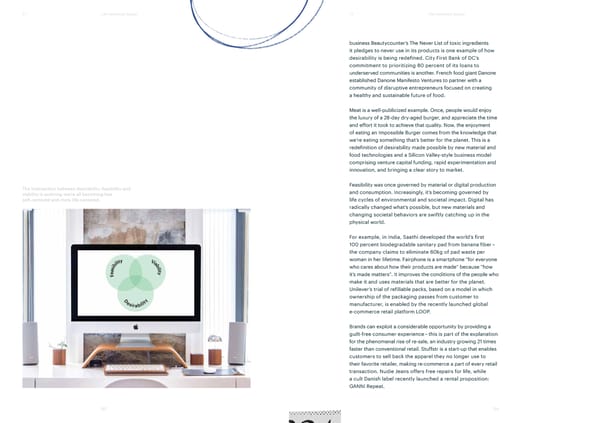T7 Life-centered design T7 Life-centered design business Beautycounter’s The Never List of toxic ingredients it pledges to never use in its products is one example of how desirability is being redefined. City First Bank of DC’s commitment to prioritizing 80 percent of its loans to underserved communities is another. French food giant Danone established Danone Manifesto Ventures to partner with a community of disruptive entrepreneurs focused on creating a healthy and sustainable future of food. Meat is a well-publicized example. Once, people would enjoy the luxury of a 28-day dry-aged burger, and appreciate the time and effort it took to achieve that quality. Now, the enjoyment of eating an Impossible Burger comes from the knowledge that we’re eating something that’s better for the planet. This is a redefinition of desirability made possible by new material and food technologies and a Silicon Valley-style business model comprising venture capital funding, rapid experimentation and innovation, and bringing a clear story to market. The intersection between desirability, feasibility and Feasibility was once governed by material or digital production viability is evolving–we’re all becoming less and consumption. Increasingly, it’s becoming governed by self-centered and more life-centered. life cycles of environmental and societal impact. Digital has radically changed what’s possible, but new materials and changing societal behaviors are swiftly catching up in the physical world. For example, in India, Saathi developed the world’s first 100 percent biodegradable sanitary pad from banana fiber – the company claims to eliminate 60kg of pad waste per woman in her lifetime. Fairphone is a smartphone “for everyone who cares about how their products are made” because “how it’s made matters”. It improves the conditions of the people who make it and uses materials that are better for the planet. Unilever’s trial of refillable packs, based on a model in which ownership of the packaging passes from customer to manufacturer, is enabled by the recently launched global e-commerce retail platform LOOP. Brands can exploit a considerable opportunity by providing a guilt-free consumer experience – this is part of the explanation for the phenomenal rise of re-sale, an industry growing 21 times faster than conventional retail. Stuffstr is a start-up that enables customers to sell back the apparel they no longer use to their favorite retailer, making re-commerce a part of every retail transaction. Nudie Jeans offers free repairs for life, while a cult Danish label recently launched a rental proposition: GANNI Repeat. 93 94
 xReport Page 53 Page 55
xReport Page 53 Page 55